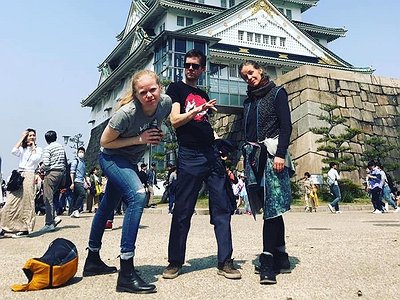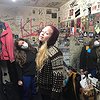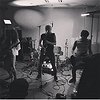Part 3
Production tools, from instruments to complex software environments, contribute to the compositional process. How does this manifest itself in your work? Can you describe the co-authorship between yourself and your tools?
Guro: I have had this realization on how I approach creative meetings, be it composing from a specific idea or improvisation. Drawn towards unidentified energies and movement. In this I feel I approach (or want to approach) all sound with equal worth and I find the prepared sounds of ex double bass or moving a paper the same. Sometimes it is just energies I sense and use and that I strive towards. My main base is me and the analogue resources I have.
I am integrating technology into this when it's needed. With Moe it's effect pedals and everything else which is an important part of how we sound. And composing for the figure theatre company Plexus Polaire recording equipment is great and useful in the composing process. But I have to write ideas and structures, words, compositional ideas down on paper throughout the whole process. I have to write.
How do you see the relationship between sound, space and performance and what are some of your strategies and approaches of working with them?
Guro: With MoE we always change the setlist according to the room, amps, PA, stage. I think that's how I have always been working, adapting my performance to make the most use of the space I perform in and by this get the most out of myself. I feel I have gained quite some knowledge here, through multiple mistakes and not working setlists.
The Octobass is another story. The sound wave of its deepest tone (C) has a length of 21, something meters. And being below human hearing as well, there is a whole universe to be discovered with that beautiful monster. But I feel my strategy of adapting goes along with how I want to be as a human and musician, artist, being able to see the potential in me through each different aspect in different rooms, environments, obstacles and possibilities.
I am trying also the other way: Set myself a desired goal and to go for that. But it always confuses me because I am so much a process person and need the reflections along the way, wanting to learn from the reflections, and that the process is my goal. Not saying I follow and change after every straw in my way … but although I do not change my path, I want to allow the obstacles presence and see what it does to me.
Mette: I have been doing a lot of solo shows, and here the room really comes into play. I work with the room and the energy between the audience. When it's a wet room with a good acoustic, even the smallest of sounds expand, and you can almost touch the sound, textures stand out as three dimensional. On a larger stage relying on PA, filling a room that holds a couple thousand, with the sound of a solo saxophone, sound becomes a surrounding that you immerse yourself in. Intimacy and energy between artist and audience transforms on a larger stage, in some way you only have the sound you produce as language.
Our sense of hearing shares intriguing connections to other senses. From your experience, what are some of the most inspiring overlaps between different senses - and what do they tell us about the way our senses work? What happens to sound at its outermost borders?
Guro: Having an octobass surely has given more views towards this. Visual listening has become a term of investigation to me. What your expectation tells your ear what you should hear. And also, something else though, the flock mentality of us human beings. The majority are incapable of trusting their ears and senses to tell if you like something or not. The octobass brings an unease from its low frequencies. like an ambush of sound, unexpected for the eye. I get some of the same sensation from doing MoE duo concerts. It's offensive, this music without drums, just guitars, synth and vocals. It amuses me. It opens up into a new space for me and I think for the listener also.
I have gotten a realization towards working with multidisciplinary projects, from my work with the music for the puppet theatre Moby Dick (Plexus Polaire) and my own composition Resonant Silence. The chaos ahead for every art form to meet, brings a deep joy, it's like some deep humanity is becoming visible in these meetings, creating bridges between different knowledge and another knowledge that can become visible from these meetings.
Mette: This is a really cool question. As an example, try cutting out all other senses and just listen, the experience of sound will be perceived completely different from when you add other senses like smell, touch and seeing. I guess the most vivid coalitions with sound lies in smell and taste. I have certain smells that take me back to a certain place, one being a certain one, that takes me back to my childhood vacations on Fyn in Denmark.
I think in the middle of all the senses, is the brain. The brain is strong. And I think we hear not only with our ears, something I have talked with Guro about as well. How all the other senses, feelings, expectations, focus and mindset, engagement interacts with one another, in both a good and bad way. In some of its outermost borders sound becomes physical. I suppose at its most primal function sound is a way of seeing.
Art can be a purpose in its own right, but it can also directly feed back into everyday life, take on a social and political role and lead to more engagement. Can you describe your approach to art and being an artist?
Guro : As it is always someone watching, listening, giving resonating pulses from an everyday life and back, and to the performed, it's tricky to describe what it is its own purpose. Esthetically perhaps, for pleasure, for anger, disgust, but if it only reaches this level, is it enough? Always searching for new roads, wanting to expand, first as a way of surviving from the intense presence I caught myself in, and now as a consciousness towards giving other views to life. I feel so good damn grateful that this is my life. I can tour with my music. I can make new music, collaborate with extraordinary people, play concerts for people in all ages, sizes and hopes. It's an obligation to keep pushing.
Mette: Yeah I think it can be all that, depending on one's approach. I think art has a way of gathering people in a large scale, but to actually change something, to be aware of the impact it can have, to execute it, to actually do that on a large scale, it takes something more. Leading into your next question ...
It is remarkable, in a way, that we have arrived in the 21st century with the basic concept of music still intact. Do you have a vision of music, an idea of what music could be beyond its current form?
Guro: Well, how we listen is in the reverse order. Never has there been more music produced than now but perhaps never less music actually listened to. I see a stagnation in this, our ears getting used to listening via poor speakers, and music being surface, surface music, as how capitalism wants you to view life. That I find disturbing.
But I guess there are multiple layers in this as everything in society, still people are high tech freaks, concerts and vinyl freaks. I hope we go back to the renaissance in some aspects, finding ways that music and ordinary life are linked on more closer terms. Perhaps I am making that up, that it was like that in the renaissance. They were more craftspeople …
Mette: I see music developing more into a counter crossed genre, playing a smaller part in a greater whole of shaping a better society. I think music might exist being music as we know it, and play an important role together with all the arts, climate, debate, diversity, gender roles, equality, racism ...







